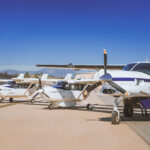By Keith Mwanalushi
RwandAir has seen a strong post-pandemic rebound with most of its international routes now reopened. However, services to China – a major market for African and Chinese traders – remains suspended.

“We have not been able to resume our flights to China because the circumstances are beyond us, but we know there is huge demand,” said Habba Adijah Kamwesiga, RwandAir’s senior manager for promotions and communications at the World Travel Market in London recently. She explained that while the process for the resumption of operations to China is slow, the airline is offering alternative routings, especially for traders.
“China is not on the conversation on a day-to-day basis because of the many factors beyond our control but for traders, they can opt to fly with RwandAir via Dubai and most airlines, especially the big carriers, are actually doing that,” she added.
Making connections
Connecting Africa effectively and linking up intra-regional markets is a key focus area for African aviation, as cited by organisations like IATA and AFRAA. RwandAir’s biggest footprint is Africa and as Adijah Kamwesiga indicates, the mission is to continue connecting Africa. “Africa is really paramount for us,” she commented.
Inter-connectivity in Africa is often tainted by high costs, with long and painfully slow regulations and limitations that facilitate that connectivity. Flying between African countries is often expensive, and it is not unusual to see passengers connecting via Europe to return to Africa. However, change is in the air. “There are many factors pushing airlines to do better for the continent and as an airline, we are piggybacking so much on what Rwanda is doing,” Adijah Kamwesiga explained.
For instance, Rwanda has pioneered an open policy permitting every citizen of the world to obtain a visa on arrival – and free for African travellers. Adijah Kamwesiga reckons such initiatives are helpful to unlock opportunities and to boost intra-African travel, thereby easing some of the cost limitations associated with regional travel. In fact, just last month authorities in neighbouring Kenya also announced ending visa requirements for all African citizens by the end of the year.
Certainly, the Single African Air Transport Market (SAATM) project is the most crucial initiative on the continent aimed at creating a single unified air transport market in Africa. SAATM is a widely supported initiative that, once fully implemented, will open up Africa’s skies and promote the value of aviation throughout the continent. There are currently 34 African countries signed up, but progress has been slow and the hesitation by some signatories to fully commit to SAATM’s objectives is reportedly frustrating for some airlines in the region.
“For us as an airline, we have expressed interest and we are very collaborative to ensure that we achieve SAATM, but it is not just one airline’s business, all the stakeholders must come together. It is a journey that every airline is taking but it is not easy, we are doing our part as an airline to achieve the objectives,” Adijah Kamwesiga added.
Expansion plan
RwandAir plans to expand to other African destinations including Maputo in Mozambique and to reopen routes such as Mombasa in Kenya which were suspended during the pandemic. In addition to typical business traffic, there is a deliberate plan to broaden access to more leisure-oriented routes like Zanzibar and encourage more Africans to visit countries within the continent in addition to the traditional hotspots like Dubai or Paris.
Further afield, RwandAir is expanding its presence to Europe and now flies to London Heathrow from Kigali. The original plan was to have a daily service to Heathrow, but to ensure operational resilience during the current season, this is now six a week. It also launched operations to Paris in June, operated by A330s.
The European routes are especially vital for facilitating connections to some key African markets like Ghana, Kenya, Nigeria and South Africa but also to underserved markets in southern Africa like Zambia and Zimbabwe. Adijah Kamwesiga disclosed that further European expansion is planned.
Growing the fleet
RwandAir flies 14 aircraft across its network in Africa, Europe and the Middle East with plans to double the fleet within the next decade. The current fleet include three A330s and seven B737-NGs. The latest example, a -800 registered 9XR-WY, was delivered in October to further expand its regional operations. Last November, the Rwandan airline also took delivery of its first dedicated freighter, a B737-800SF, to tap into the increasingly lucrative freighter market which is becoming an important sector for the airline. Other regional routes are operated by a fleet of CRJ-900s and Q-400 Dash 8 aircraft.
Industry observers suggest an order for new regional aircraft to potentially replace the CRJs and Q-400s is imminent but so far this remains speculative. However, Adijah Kamwesiga hints to a future fleet strategy potentially comprising a mix of leased and outright purchases. “The expansion is inevitable because we are growing, and to achieve our plans of expansion within Africa, Europe and the rest of the world, we need the capacity. I will not put specifics on numbers, but fleet expansion is on the cards,” she stated.
Further investment
Looking to the future, it will be interesting to see how RwandAir’s partnership with Qatar Airways plays out with its planned 49% stake announced in 2020. At the time of this writing, the Qatari investment was still pending. Reportedly, progress is at the tail end but still ongoing.
Qatar Airways has also partnered with Rwanda to build a new airport project which is also progressing well. “We’re looking at around 2026 or the year after for completion of the project but certainly, there is huge progress,” said Adijah Kamwesiga.
In May, RwandAir announced a new African cargo hub in partnership with Qatar Airways Cargo which regularly sees a Qatar B777F on the ramp. The recent pandemic also acted as a catalyst for the importance of cargo. A strategic advantage for Rwanda lies in its geographic location which provides a significant catchment area for passenger and cargo traffic from all corners of Africa via Kigali.
The key priority for 2024, according to Adijah Kamwesiga, is more connectivity. “Our number one mission is to connect as much as we can, and also to get Africa closer to the world so we will be looking at how quickly we can get to achieve those plans,” she concluded.

